Looking back: the best of Fashion Revolution Week 2019 in the West Coast
“Loved Clothes Last” Mending Bar in San Francisco
Each year the United States sends 12.8 million tons of textile waste to landfill. As style turnover has accelerated, so has our appetite for new, trendy clothing. Today we buy 4 times as much clothing as we did two decades ago, yet we get 36% less wear out of our garments before we discard them.
Inspired to empower consumers and keep clothing out of landfill, Fashion Revolution USA and the Sustainable Fashion Alliance partnered with Fibershed and California College of the Arts to present a unique “Mending Bar” experience designed to equip attendees with valuable tools that will help prolong the wearability of their loved pieces of clothing.
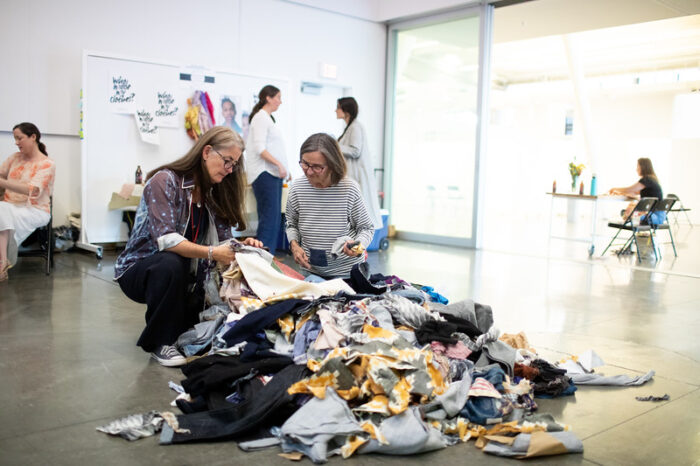
Taking place during Fashion Revolution Week in San Francisco, the event featured five mending stations for attendees to enjoy which included boro and sashiko hand mending, machine mending and altering, knit darning, creative embroidery and an upcycle station, sponsored by Bella Notte Linens, where attendees made drawstring bags from a variety of fabric scraps. Speaking of fabric scraps, the attendees took delight in searching [and in some cases swimming] through a huge pile of fabric scraps donated by Indigo Handloom to use in their repairs and for patchin and other creative projects. In addition to light snacks and Revive Kombucha, attendees showed off their renewed and repaired duds in our “Loved Clothes Last” photo booth by Paige Green Photography with gorgeous denim backdrop handmade by Sierra Reading from denim remnants donated by local farmers and unspun denim.
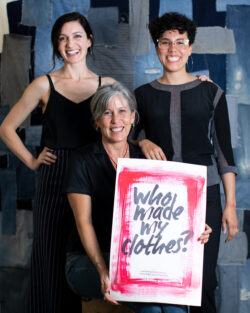
Special thanks to all the artisans who helped make this a possibility: Rebecca Burgess, Jess Daniels, Sierra Reading, Marlie de Swart, Heather Podoll.
Sustainable Fashion Forum in Portland, Oregon
This April not only marked the third annual Sustainable Fashion Forum but it was also the biggest year in SFF history to date! 350+ designers, brand reps, thought leaders, educators, makers and fashion enthusiasts came from near and far to join us for a fun and inspiring weekend celebrating ethical and sustainable fashion.
We kicked off the SFF weekend on Friday with our first ever IRL workshop about sustainable production lead by Tara St James Designer and Founder of Study NY hosted by Provenance Hotel’s Hotel Lucia. During the workshop we discussed ways to incorporate sustainability into the product design/manufacturing process as well as considered creative ways to improve a product’s ecological footprint.
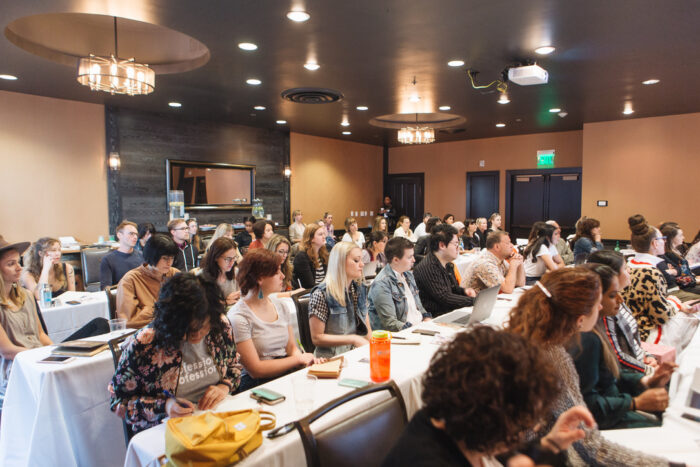
Later that evening, we headed back to Hotel Lucia for our invite-only dinner party bringing together key fashion industry leaders, summit speakers and VIP guests for a commemorative evening of festive mingling, elevated conversation, and premium dining. It was so rewarding to have the opportunity to connect and have fun with our community before the conference.
The following morning we gathered bright and early at Ecotrust’s Irving Street Studio for the Conference where we heard from designers and reps from ethical/sustainable brands like Mara Hoffman, Elizabeth Suzann, Ace & Jig, Sotela, Fair Trade Certified, Sseko Designs to media outlets like Elle.com, Fashionista, Gray Magazine, Portland Monthly Mag and more (!!) who shared their collective knowledge on how we can all do better about how we impact the world with our clothing/fashion/textile choices.
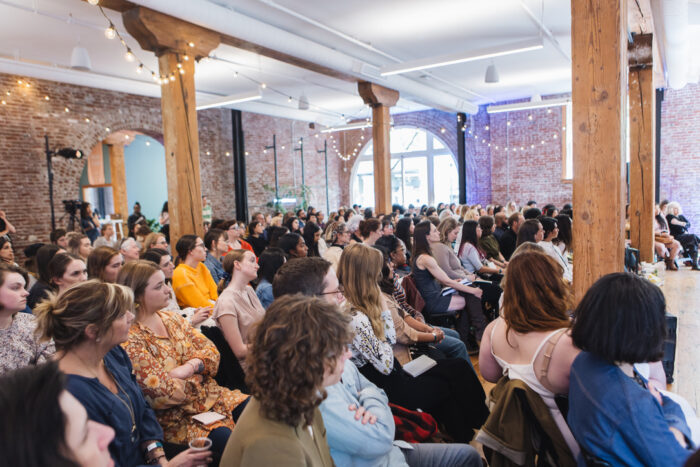
In between the panel discussions and keynote presentations, attendees had the opportunity to shop a curated selection of vendors including Grayling Jewelry, Made Trade, Mara Hoffman x The Renewal Workshop and Altar.
Spin Laundry Lounge created an amazing visual installation that detailed sustainable laundry care and Fair Trade Certified asked attendees to share their thoughts on what Fair Trade Certified apparel means to them.
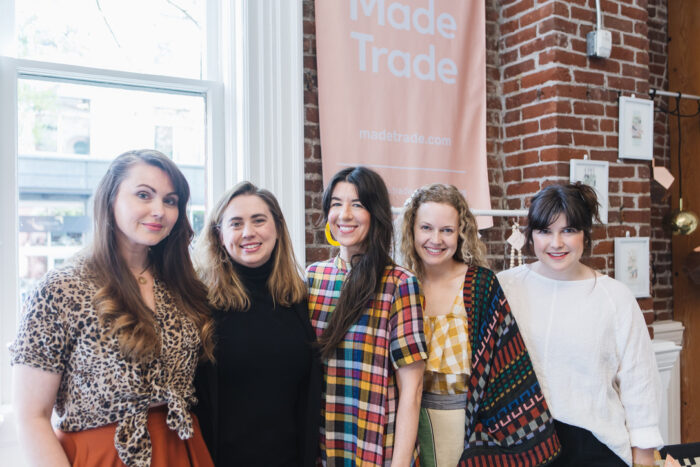
What better way to end the SFF weekend than with a fashion show! In addition to all that we learned about pressing forward in sustainability regarding the way we produce clothing, we also wanted to remind ourselves to consume less and maximize what we already have in our closets. With that in mind, we were incredibly lucky to have Ellie Huges, of Selflessly Styled curate a sustainable capsule from some of the brands who spoke on the SFF main stage like Altar, Ace & Jig, Brass Clothing, Mara Hoffman and Sotela. With only 9 pieces Ellie created a super unique fashion show concept by styling the items 21 different ways on 21 amazing models to showcase the versatility of our wardrobes!
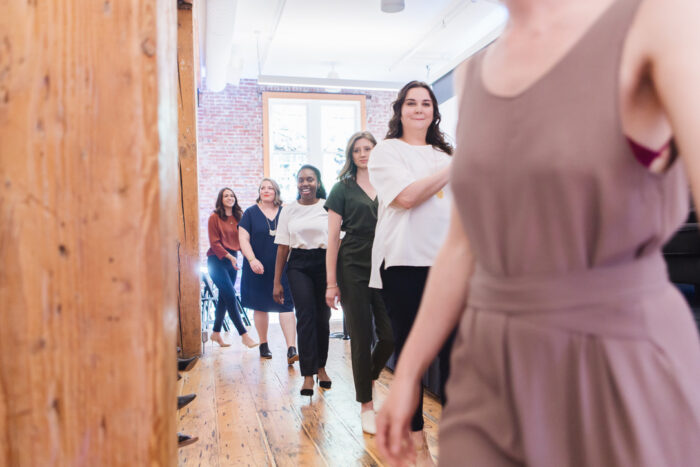
Missed this year’s SFF? No worries! Meet them in Portland April 24th-25th, 2020 for the 4th annual Sustainable Fashion Forum! Can’t wait? Catch them on tour this summer during the #styledsustainabletour! Details announced soon.
Made in L.A. Screening and Panel Discussion in Los Angeles
In honor of Fashion Revolution Week Nicholas Brown (Fashion Revolution USA) and Elisha Chan (Fair Trade LA) hosted a very special screening and discussion of Made in L.A. a powerful documentary that follows María, Lupe and Maura: three Latina immigrants struggling to survive in Los Angeles sweatshops. One day, determined to win basic labor protections, they embark on a three-year odyssey that will transform their lives forever. Compelling, humorous, deeply human, Made in L.A. is a story about immigration, the power of unity, and the courage it takes to find your voice.
After the screening, FR USA hosted a panel talk with special guests, including Aditi Mayer (ADIMAY), Rebecca Hu (USAS), Victor Narro (UCLA Labor Center) and most importantly garments workers sharing their firsthand experiences.
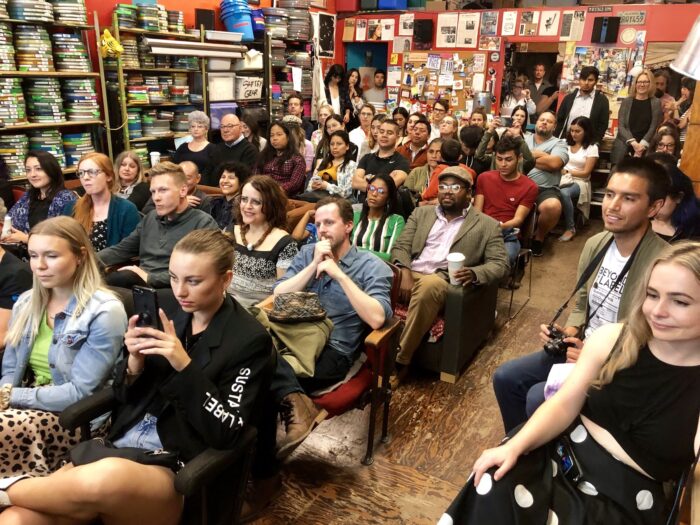
Textile mills are one of the few industries that do not require experience, proof of citizenship (passport/documentation), or the ability to speak English, so many immigrants end up working there. However, this system exploits vulnerable people by capitalizing on the poor who have few employment options. Textile factories pay piece rate, not by the hour, which means workers are not granted paid breaks. These workers are paid as low as 3.5 cents per garment, which averages to be way under minimum wage, even if working overtime.
Current law doesn’t hold owner of labels accountable.
Lack of enforcement has made it difficult to instill labor laws within the garment industry. Many regulatory agencies do not visit textile factories to check if conditions are unsafe or toxic places to work, which has left garment workers unprotected for so long. At times it takes 5 years or coax in a local agency to conduct an inspection. The trouble is, once a regulatory agency visits a sweatshop, it’s difficult to hold corporations responsible because it is hard to pinpoint that the clothes made in the sweatshop are the same clothes sold in large retailers.
Big fashion retailers such as Forever 21 hire several layers of contractors who hire workers to sew clothes for them. Due to separate between F21 and the workforce (and loopholes in the law), it is difficult to prove retailers liable for unethical practices, which is a strategic method to continue exploitation. The force behind this behavior is fueled by the consumer’s demand to buy clothing for as cheap as possible.
The documentary ‘Made in LA’ depicts the garment industry in the early 2000s, but the situation is the same today, more than 15 years later. Panelists at the screening in Echo Park revealed they are paid only $5 an hour, which is a common situation with garment workers throughout the Los Angeles.
Global Swap Event in Los Angeles
Swap Society Inc., the online clothing swap that gives consumers equal value for their clothes, co-hosted the Global Swap Event Los Angeles at The Riveter West LA in partnership with Fashion Revolution USA and Global Fashion Exchange in support of the United Nations Sustainable Development Action Campaign. The event featured a clothing swap with personal styling sessions, a panel on sustainable fashion, and a short screening of the feature film Riverblue, Fashion Revolution’s Who Made My Clothes, and Remake’s newly released Made in Mexico.
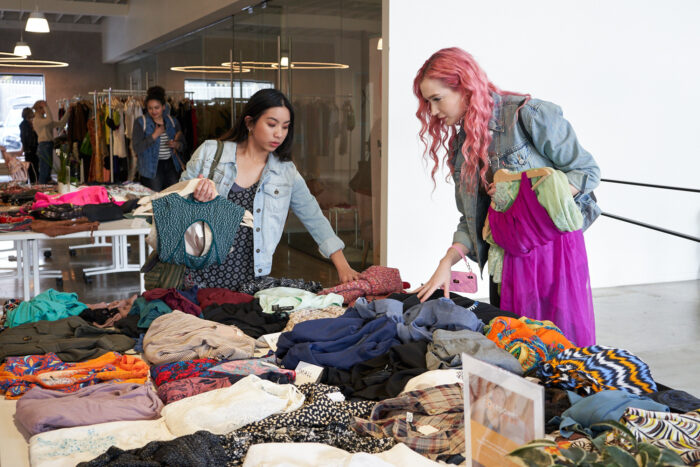
Women from the Los Angeles area were encouraged to clear their closets of items that don’t fit, that aren’t their current style, or that they bought but never wear, and swap them for items they want to wear now. Unlike most swaps that follow a “give an item, take an item” policy, Swap Society uses a proprietary points system that ensures customers get equal value for the clothing they swap. Attendees swapped hundreds of garments at the event while receiving sustainable style tips from eco-influencers Sonia Kessler and Naomi Goez.
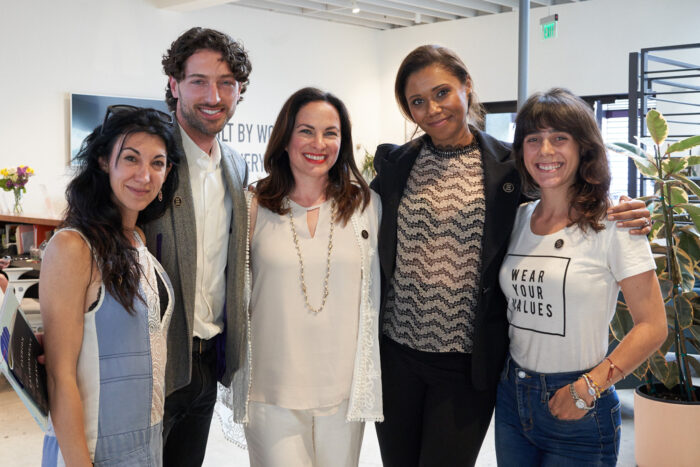
The panel was moderated by Swap Society Co-Founder and CEO, Nicole Robertson, and featured Lisa Mazzotta, producer of Riverblue, Nicholas Brown of Fashion Revolution USA, Eleanor Amari of Remake and producer of the film Made in Cambodia, and Toks Olagundoye, actress and sustainable fashion advocate. The panel discussed the myriad problems with the fashion industry and provided actionable steps that individuals can take to change their consumption habits.
“We love fashion, but we are also extremely concerned about the impact the fashion industry has on people and on the environment,” said Robertson. “Our throw-away culture goes beyond single-use disposable bags, bottles, cups, straws and cutlery. For many, clothing has become disposable too. This behavior has dire consequences for the planet and for the people who make our clothes. We created Swap Society to make it fun and easy for women to mix up their wardrobes without buying something new.” Robertson added, “We are honored to be a part of this momentous initiative in partnership with Fashion Revolution USA and Global Fashion Exchange to help combat the global issue of fashion waste, and to empower people to make a fashion statement that truly matters by encouraging them to ask brands, ‘Who made my clothes?’”
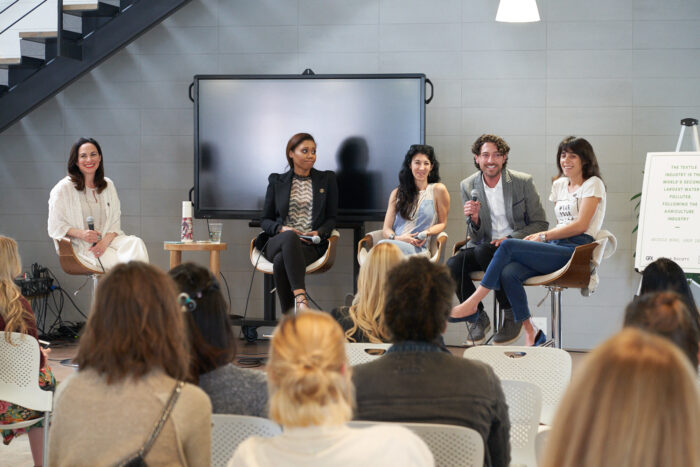
“We have to remember that all of us are a part of the fashion supply chain too. Once our clothes reach us, we need to make sure we do our part to ensure they are taken care of properly. When our clothes no longer serve us, please donate, sell, swap, upcycle, recycle…anything but throw them into the trash,” Brown advised. “Finding out where our clothing will end up after we are done with them is just as important as finding out who made them.”





